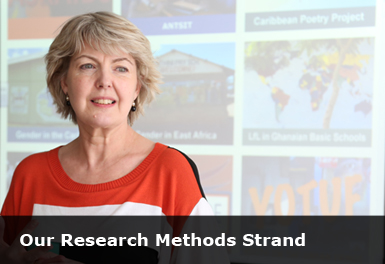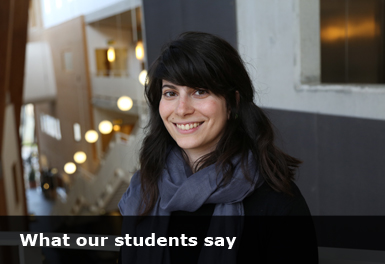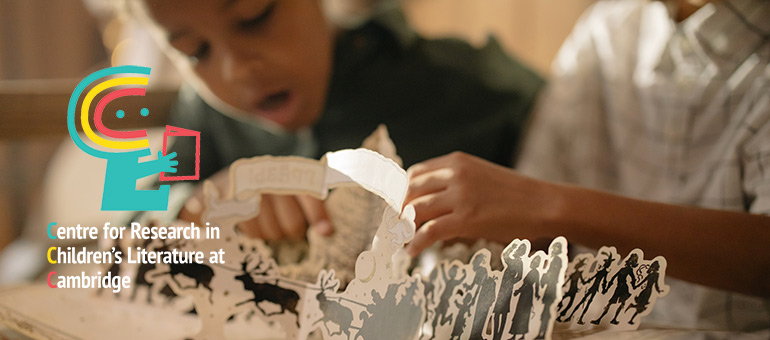the staff have knowledge in depth of a remarkable range of theoretical and critical positions, as well as an encyclopaedic knowledge of texts
(Professor Peter Hunt, Emeritus Professor, University of Cardiff, External Examiner)
Important information
This course is only available as a one-year part-time course to students who have already completed their PGCE at the Faculty of Education. Otherwise, please apply for the full-time course.
| Key Facts | |
|---|---|
| Route Co-ordinator: Dr Blanka Grzegorczyk | Full-time enrolled 2024-25: 19 |
| Open to: MPhil, PGCE-MEd | Part-time enrolled 2024-25: 4 |
| Full-time deadline: 26/02/2026 | |
| Part-time deadline: 14/05/2026 | Written task required for application |
Overview of the course
In this route, students will meet old favourites in fiction, film, poetry and picturebooks and make exciting new acquaintances. They will be introduced to topical debates on the nature and social function of this controversial and multifaceted body of literature.
They will also be provided with the tools for a critical assessment of texts written and marketed for a young audience. All students on the Critical Approaches to Children’s Literature course are automatically members of the Centre for Research in Children's Literature at Cambridge which provides a superb study environment for all our postgraduate students in children’s literature.
Why choose us?
- Benefit from teaching by internationally renowned Faculty staff specialising in children's and young adult literature
- Enjoy a wide range of theoretical frameworks and approaches to literature for young readers
- Closely engage with the activities of the Centre for Research in Children's Literature at Cambridge
- Join a unique and vibrant community of postgraduate students and researchers in children's literature
- Benefit from the experience of meeting fellow students from all over the world
- Experience a teaching approach that promotes research-orientated pedagogy and encourages critical engagement with literature and media for young people
- Enjoy personalised support and mentoring through one-to-one supervision
- Gain knowledge and develop research skills to continue to a PhD in children's literature
- Develop skills for employability across a range of institutions including academia, publishing and reading promotion
What does this course offer?
As well as providing a strong grounding in critical perspectives, this unique interdisciplinary course offers several distinctive elements which distinguish it from other courses on offer in other universities:
- a prominent theoretical focus, including areas such as cognitive poetics, posthumanism, new materialisms, postcolonialism and gender studies
- qualitative action research involving empirical work with children
- a strong emphasis on picturebooks, comics and graphic novels, as well as visual and multimodal literacies
- coverage of modes and genres such as poetry and non-fiction for children
- teaching that extends into areas including the intersections between childhood studies and children’s creativities, and between intellectual histories and material cultures
- experience in archival research
- a seminar series where visiting scholars, guest academics, writers or illustrators give a talk followed by the opportunity for questions and discussion.
In addition, students are welcomed into a thriving research community with opportunities to interact with many students who have previously taken our MPhil/MEd route and are now embarked on doctoral research on children's literature.
How is the course organised?
Course assessment
Assessment will be through a range of formats (which may include coursework, written and oral examinations, posters, presentations and projects) and a dissertation, each designed to be personally rewarding as well as professionally enlightening and intellectually challenging.
Student joining Year 2
Students joining in the second year of the course will only submit a dissertation.
MPhil students
Students on the MPhil course complete the course in one year and have teaching sessions throughout the week.
PGCE-MEd students
Students on the PGCE-MEd course have one teaching session per week on a Wednesday afternoon (2-7pm).
 Research Methods Strand
Research Methods Strand
Alongside these modules, you will benefit from Research Methods teaching.
This is taught across all thematic Masters within the Faculty of Education, allowing you to interact with others on different routes.
It covers a broad range of social science research methods and is essential for Masters level understanding and critical engagement with the research literature in many specialist areas and in education more generally.
Through this strand you will acquire the skills necessary for designing, conducting, analysing, interpreting and reporting a research study for thesis.
 Who are the course team?
Who are the course team?
 Where do our students go?
Where do our students go?
Our graduates are the emerging stars in their field of research and Cambridge ambassadors throughout the world.
They have a wide choice of career options, including:
 What our students say
What our students say
‘The MPhil course in children’s literature is unique for its interdisciplinary breadth.
As someone coming from a strictly literary background, I found myself continually surprised and challenged by the dual focus of literary study and educational research.
Being exposed to research methodologies in education, such as reader response criticism, was eye-opening in a genre like children’s literature, which, after all, includes the intended audience in its title.
One simply cannot study children’s literature as an adult without attempting to understand how children read texts, and this course is predicated on this premise.
The MPhil, being a one-year course, is necessarily short, and my own year was abbreviated further by the pandemic, but as a whole, the curriculum gave me a sampling of a rich array of texts, from early primers to the present day.
In tandem with the primary sources, we were exposed to a diversity of secondary sources across many schools of criticism, including postcolonial, feminist, and gender theories. I would say, with such a dizzying array of primary and secondary sources (not to mention a whole panoply of educational research methods), it can be quite overwhelming to choose one’s own research path within such a short period.
I can also say, however, that both of my supervisors, despite the necessary limitations of the pandemic, went above and beyond to ensure my confidence in my chosen projects. They were immensely helpful, both within and beyond their specialties. The diverse range of interests across the faculty ensures that someone, somewhere will have some knowledge of the subject at hand.
All in all, this MPhil course led me in many new directions and re-affirmed my dedication to the study of children’s literature.’
MPhil Student, 2019-20 (August 2021)
‘The MPhil in Education (Approaches to Children’s Literature) challenged and enriched my thinking as a writer and educator. The course expanded my knowledge and understanding of children’s literature, exposing me to a diverse range of children and young adult literature across a range of contexts and genres. The academic staff were exceptional in their high degree of dedication and extensive knowledge of their subject areas. They were not only incredibly generous with their time and advice but delivered engaging lectures that included thought-provoking primary and secondary reading options. The brilliance of this course is that you are working with the great minds in the field and can enter thoughtful dialogue with them about your ideas. Relatedly, I was well supported by an incredible supervisor, a brilliant mind and leading academic in the field who encouraged and inspired my thinking. This degree of support permeated the course with both staff and students being engaged and enthusiastic which created a warm and engaging learning environment. Special mention goes to the library staff at both the Education Faculty and Homerton College who were always friendly faces and guiding lights. Overall, this course is an incredibly rewarding one which will open doors to further academic study. This course paved the way for my PhD research and continued immersion in the field of children’s literature.
MPhil student, 2019-20 (August 2021)
‘Thanks to engaging seminars, thought-provoking book clubs and fantastic study spaces, my cohort became a close group of enthusiastic researchers - undoubtedly friends and colleagues for life. It was wonderful to see each other grow in confidence as the year progressed and discover our own avenues of research, supported by our supervisors. With each assignment I appreciated the encouragement to take risks and delve into topics that were completely new to me, including empirical research, pop-up books and digital humanities. I left this course feeling incredibly inspired and excited to continue to explore the field of children's literature.’
MPhil Student, 2018-19; current PhD student (July 2021)
‘The course changed my life and opened doors for me professionally. The seminar and supervision format provided an intimate, dynamic environment to embrace the serious study of children's literature from a wide range of theoretical perspectives. My undergraduate degree was at an art school in London, so I was a bit nervous about joining the Faculty of Education because I thought it would be full of Miss Trunchbull-like ex-teachers. But interdisciplinarity is at the heart of children's literature studies (and education as a discipline) and part of the magic is different people coming together from different perspectives. I recommend the course wholeheartedly.‘
MPhil Student, 2017-18; current PhD student (July 2021)
‘After really enjoying a Children's Literature module on my BA degree, I started doing some research about studying Children's Literature as an MPhil. I was initially wary about applying because I knew that as adults, we can sometimes be quite protective over texts we have read and enjoyed as a child. I knew the course wouldn't be sentimental, but I wasn't sure about the other students in the class. However, from the first term, it became clear that the course's modus operandi was to give you the tools to read children's literature critically, thus enabling (and encouraging!) the robust, vigorous discussion which inevitably followed. And robust, vigorous discussion we did have! ! I was lucky to be part of a fairly diverse cohort, and I think I learnt as much from my fellow scholars as I did from the lecturers.
I am now doing a PhD in children's television which involves some empirical research. I often take my skills and knowledge of research methods for granted, but I have the MPhil course to thank for making sure I was fully prepared.
MPhil student, 2017-18; current PhD student (August 2021)
‘To undertake the Critical Approaches to Children's Literature programme is to participate in a hugely welcoming, rigorous and nurturing postgraduate experience. I was part of the 2016-2017 cohort where research staff and fellow students alike possessed an enthusiasm that made every seminar, supervision and/or spontaneous faculty café catch-up feel enriching. The programme's range of texts, paired with the course team's various areas of expertise, means that you are able to confidently develop your own research interests.
Furthermore, the training and research that I completed during my time on the programme continues to be invaluable in developing my current PhD research and academic network.’
MPhil Student, 2016-17 (August 2021)
Being part of such a vibrant research community has been really special‘I've run out of superlatives to describe the course! From the minute one seminar ended, I would look forward to the next; the enthusiasm of the course team was infectious and their expertise in a wide range of areas made for such exciting, rich learning. Being part of such a vibrant research community has been really special.’
PGCE-MEd Student, 2015-16 (July 2016)

